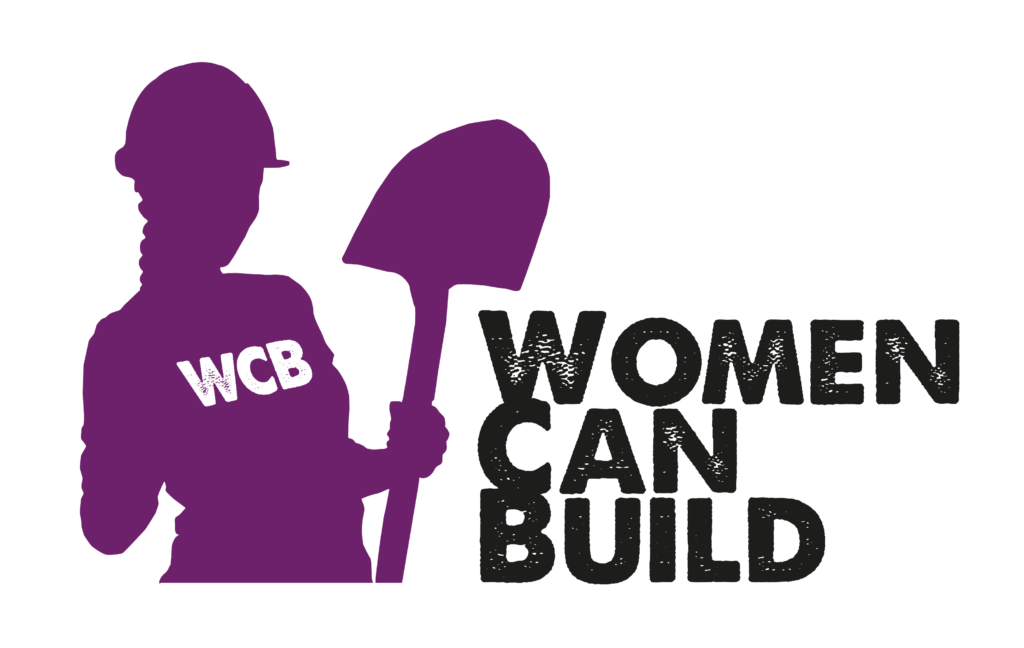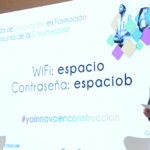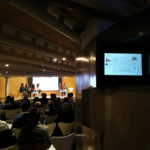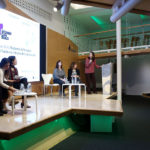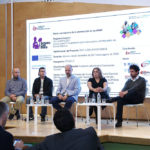Over a hundred professionals and another hundred virtual assistants attended, on October 30th, the Second Conference on Innovation in Training in the Construction Industry held by Fundación Laboral de la Construcción, in cooperation with Bertelsmann Space, in Madrid. The meeting revolved around Virtual Reality, gamification, BIM, risk prevention, training and commitment to the sector. This last theme welcomed the Women Can Build project as an example of good practices in gender equality.
Esther Rodríguez, International Projects technician at Fundación Laboral de la Construcción, summarised the pillars on which the consortium’s work is based: training, labour insertion and visibility. As an example of this work, the testimonial video of the students and teachers of Fundación in Madrid was shown for the first time. Together with Women, Javier González, responsible for the International Projects department, introduced other projects in which the entity participates, focused on the topics of the event:
- The environmental skills for teachers in the construction industry provided by the Bus.Trainers project were presented by Beatriz Oliete, technician from the entity.
- The digital community that links together apprentices, trainers and companies to promote work-based learning and the transition of young people to employment, of the TransToWork project, was described by the also technical expert, Silvia Santos.
- Clara Garcia, technitian as well, presented another tool aimed at professionals and trainees, focused on promoting business skills in the construction sector, through the Tycon project.
- The BIM methodology was the protagonist in Laura Mesa’s intervention to present the Net-Ubiep initiative, a European network for improving the energy performance of buildings.
- The serious game to improve basic Health and Safety skills in work at heights of the Upp Games initiative was presented by the coach Belén Blanco.
- And the technician David Pesado presented the prototype of a Virtual Reality application for the improvement of Health and Safety competencies in Road Maintenance and Operation (Coex) works of the VRoad project.
Connected Perspectives
Dani Seseña, presenter and director of the program Cámara abierta on TVE, was the master of ceremonies for the event and also shared a talk entitled “Perspectiva conectada”. “We are at a moment of convergence of many worlds and many contexts, in which the information society and the construction industry 4.0 share technological advances. We all have to learn and make a place for ourselves, so workshops and courses like those of the Fundación Laboral are necessary to renew ourselves, to understand what is happening and to incorporate the positive into our reinvention,” he said.
“And I ask myself: What does all this mean for the future? What information/ communication /learning process is behind it? How many people can it transform within the construction industry? With these questions, Seseña left open the challenges that have to be overcome by the professionals of the sector, the companies and all the agents involved. Because “technology is absolutely necessary to improve processes, especially learning processes, which is what life is all about, and this ‘being under construction’ is no longer a transitory state, but a dynamic process that does not stop”, he concluded.
Social scenarios, technological disruption and new professional profiles
Juan José Juárez, senior project manager of the Bertelsmann Foundation, highlighted the three challenges we face: new social scenarios, technological disruption and new professional profiles.
For Juarez, the first challenge has to do, among other things, with sustainability, energy efficiency and the consumption of materials and their impact. “Only the manufacture of cement in the world is responsible for 7% of CO2 emissions, when aviation industry is responsible for 3.6%, which is half, and receives more pressure for that responsibility. We have the challenge of making a much more efficient sector,” he said.
Regarding technological disruption, the Bertelsmann spokesman said that we must take advantage of what the advances provide: “After all, today, the way in which construction processes are approached, with technologies such as Virtual Reality (VR), allows us to predict possible errors and rectify them before they are built, as well as knowing how a building will impact the environment, usability, etc.
Finally, he highlighted the challenge shared by the Bertelsmann Foundation and the Fundación Laboral: “We are aware of what is happening with the professions, with those professional profiles that hybridize”. In this sense, Juan José Juárez also raised several issues, defending that “technology changes the professional profile”, as in the case of trenchless technology, with the use of drones. “We are no longer talking about someone who opens a hole in the asphalt to see what is underneath, but someone who drives a drone to avoid opening where there was no fault. So, how do we train this professional, where does he/she come from, what is his/her original training, how do we complement it, how do we make it possible for someone who has been trained in civil engineering to receive training in drone handling and the handling of information and data from that drone?
The Bertelsmann representative assured that this change is a challenge that the institutions that collaborate in training have to face. “That is why we welcome the Fundación Laboral de la Construcción, because we are very much in line with this challenge that we have as a society, to be the most effective, the most agile in these training processes, which are increasingly complex. We have to cooperate, we have to facilitate the transit of students, trainers, apprentices, professionals for this retraining, in order to make it easier to complete the training and to adapt it throughout life”.
Drivers of sector transformation
After a break, José Antonio Viejo, Director of the Training and Employment Area of the Fundación Laboral, presented the round table on “Digital skills for the transformation of the sector towards a construction industry 4.0: beyond BIM”, with the intervention of Aída Machado, technical director of Integesa; Mario Rondán, co-founder and head of Strategy and Innovation of EPC Tracker; and a three-person tandem formed by Óscar Aranda, director of Management Systems (Quality, PRL, Environment and Innovation) of the Lobe Group; Izan Liarte, a Lobe Group worker and former student of the Fundación Laboral de la Construcción de Aragón; and Juan Lobaco, head of studies at the Integrated Vocational Training Centre of Fundación Laboral de Aragón.
Enrique Corral, general director of the Fundación Laboral de la Construcción, closed the second edition of the Innovation Conference, assuring that they are fully aligned with the vision of the entity’s strategy to “be the driving force behind the transformation of the construction sector”, as well as with the three values of this strategy: “commitment to the sector, innovation and efficiency”.
After a review of the day, Corral concluded that “events like this make us all feel proud of the Fundación Laboal de la Construcción team”.

